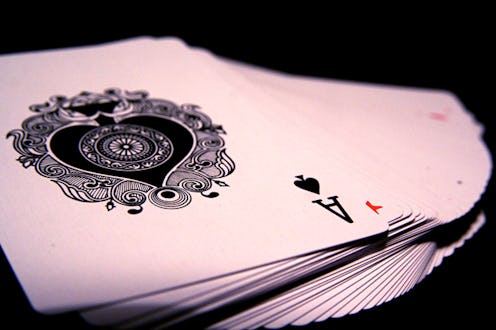
At first glance, magician Hudson Taylor’s YouTube video, "Awesome Card Trick About Feminism," is pretty unassuming. Uploaded in July and currently recirculating, Taylor’s video features him at a table in a dimly lit room with a stack of playing cards in his hands. But when he starts talking about feminism, the magic really happens.
Taylor begins the video with a slow burn as he shares a little personal history — namely, how he fell in love with magic as a child. Then, a little over a minute into the video, he describes his realization that he had no female magicians to look up to, and that his sisters were never granted his same opportunity to learn magic.
From there, Taylor’s discussion of feminism gradually increases in intensity, and moves into the broader, societal sphere, as he provides us with statistics which are more and more sobering. The cards serve more purpose than simple visual stimulation, too, as the numbers on the cards correspond with the statistics Taylor shares as he discusses the need for feminism and male allies, centering on issues concerning the pay gap, harassment, and sexual violence against women. Here are some of the key points Taylor reveals during his card trick:
1. Women’s Ideas are Shared Less Than Men’s
Taylor is correct — research shows that men are retweeted twice as often as women. And while it’s certainly frustrating that women’s ideas are shared less than those of men, it’s truly upsetting when we consider that women are often the targets of gender-based harassment online. For example, Pew released data showing that 25 percent of women ages 18 to 24 were the target of online sexual harassment, and 26 percent had been stalked online. Many women writers are being silenced online through online harassment and abuse. What does this mean? Not only are women’s ideas less circulated and celebrated, but women themselves are also the victims of target harassment, simply for being women and taking up space on the Internet.
2. Women Still Don’t Receive Equal Pay for Equal Work
While white women still make 77 percent of what white men make, the pay comparison is even worse for women of color. Black women receive an average of 64 percent, and Hispanic women make even less, earning 54 percent. Trans women report making 32 percent less than they did prior to their transitions. When a woman's work isn't evaluated at the same monetary rate as a man's, it sends the message that her work simply isn't as important or valued, and that's a big problem.
3. Know a Woman? She’s Probably Experienced Street Harassment
Taylor shares a particularly sobering statistic: studies show that 99 percent of women report experiencing street harassment. The study, conducted by Stop Street Harassment, includes leering, honking, whistling, sexist comments, vulgar gestures, sexually explicit comments, and kissing noises in their definition of street harassment. The objectification and hypersexualization of women has become so common in our society, this statistic hardly surprises me, though it is depressing. Luckily, movements like #NotJustHello and Hollaback! are rising up as a response to street harassment.
4. In America, A Woman is Raped Every Two Minutes
One out of every six women has been the victim of attempted or completed rape, according to RAINN. On college campuses, the rate is even higher, reports the AAU: One out of every four — that is, roughly one quarter of women — experiences sexual assault on college campuses. Roughly half of bisexual women, and one out of every eight lesbians, experience rape in their lifetime (and that rate, disturbingly, goes way up when we use a broader definition of sexual assault).
Taylor leaves his video off with a plea to men. He asks viewers a simple, but important question: when, exactly, does complacency become complicity? Feminism benefits all people, and men do have a role in feminism. Here are some resources, if you're confused about where to start or how to take action.
Watch the full video below:
Image: stevendepolo/Flickr; Man Powered Films/YouTube (4)